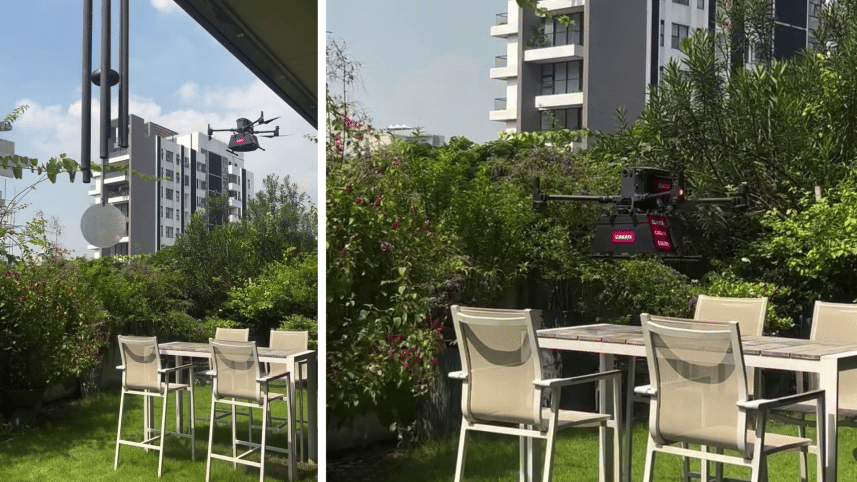Can a drone deliver dinner in Dhaka? Izakaya just tried it

In a city where tangled cables, impossible traffic, and high-rise rooftops define the urban landscape, food delivery is less about speed and more about survival. However, Rayana Hossain, MD of the Japanese restaurant chain Izakaya — which operates under ISHO (where she also serves as MD) and the DEKKO ISHO Group (where she is a director) — is seeking to flip that narrative.
Earlier this week, Izakaya conducted Bangladesh's first drone-based food delivery trial from its Gulshan 2 outlet, targeting rooftops within the Gulshan-Banani radius. According to Hossain, the pilot wasn't designed for spectacle. It stemmed from necessity: "We wanted to explore new options for last-mile delivery," she said. "But the real push came from how aggressively food delivery companies have been charging restaurants"
She pointed to a stark contrast: "In most US cities, there's a cap — apps can't charge above 15 per cent. In Bangladesh, there are no such limits. That makes it very difficult for small businesses to survive."
Izakaya, which now has three outlets across Dhaka — Gulshan, Dhanmondi, and Uttara — has intentionally stayed off major food delivery platforms, choosing instead to build more control over its delivery system. The drone trial emerged from this broader aim of creating sustainable alternatives.
How it worked
The test was carefully planned. Drones were programmed to fly within a set radius in Gulshan-Banani, delivering meals packed into specially designed boxes attached to the drones. But the sky route wasn't entirely smooth.
"We couldn't land on the ground anywhere in Dhaka," Hossain explained. "Cables, crowds, and traffic make it impossible. Rooftops were the only viable option."
Customers had to be pre-informed, waiting on their rooftops to receive the delivery, open the box, retrieve their food, and close the drone before it flew back. "It was challenging," she admitted, "but we wanted to see if it was logistically possible at all."
No free ride for the drone either
While the test delivery was offered for free, Hossain acknowledged that pricing will be one of the biggest questions moving forward. "We haven't set a delivery fee yet. We're trying to understand the costs – battery life, navigation systems, weight of food, even the human factor involved in prepping each drone."
And then there are the risks. "We haven't fully planned for safety issues," she said. "People might try to tamper with the drones. Permissions will become more complicated if we want to scale this."
Still, she's not discouraged. "We'll likely introduce caps – like minimum order values – to make it viable and secure. But for now, we're just learning."
A glimpse into the future?
Despite the logistical hurdles, Hossain sees potential in drone delivery in Dhaka. "Look at how Bangladesh bypassed credit cards and went to mobile payments. Who's to say drones won't catch on faster than we expect?"
That optimism is grounded in the initial reception. "People were excited. There was curiosity, not cynicism. That tells us something."
But for now, the drone service is paused. The team is analysing data, gathering feedback, and assessing whether this could evolve from a one-off test to a long-term option.
"If it works," Hossain said, "it won't just be a novelty. It could become a blueprint for food logistics in cities like Dhaka."
In a place where roads are clogged and delivery bikes slow to a crawl, the skies might just offer an alternative — if businesses are bold enough to try. Izakaya's experiment may not have all the answers yet, but it's asking the right questions.
Photo: Collected



 For all latest news, follow The Daily Star's Google News channel.
For all latest news, follow The Daily Star's Google News channel.
Comments